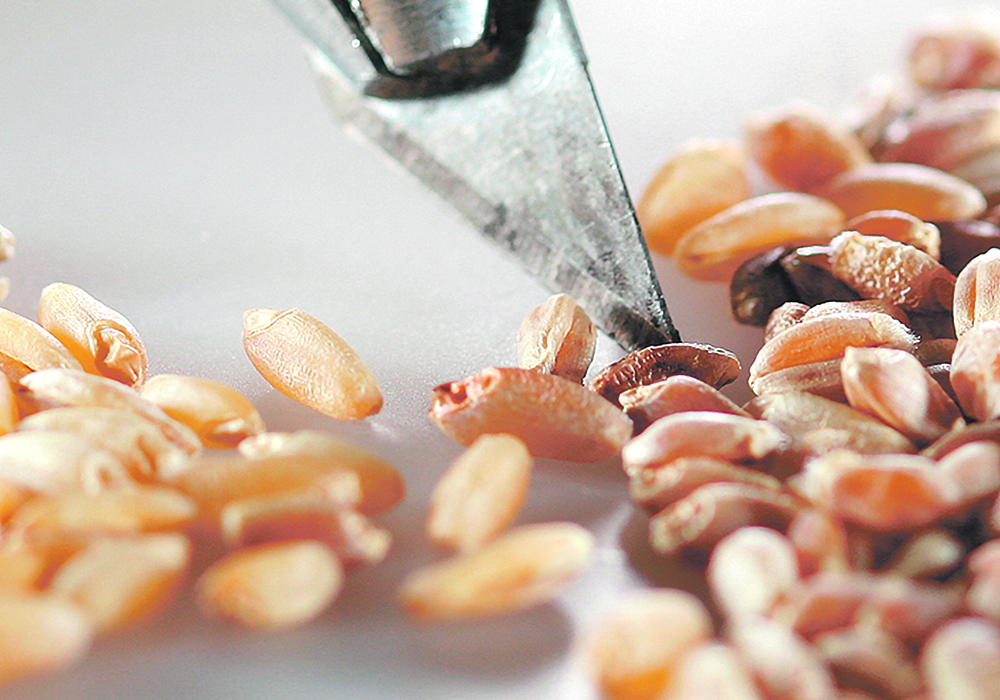Seeds Canada wants to create a new organization that will set standards and oversee the country’s seed industry.
The body may take responsibility for a number of regulatory areas, including variety registration, seed production, quality assurance, labelling and testing.
Called the Independent Standard Setting Body (ISSB), the proposed organization’s role would be comparable to the groups that set standards and practices for organic agriculture.
“This is how the organic industry sets its standards,” said Lorne Hadley, director of policy with Seeds Canada, who spoke last week at the group’s annual meeting in Winnipeg.
Read Also

Canadian Food Inspection Agency extends chronic wasting disease control program consultation deadline
Date extended for consultation period of changes to CWD program
“This is not new.”
Seeds Canada, founded in the winter of 2021, is an amalgamation of four organizations: the Canadian Plant Technology Association, the Commercial Seed Analysts of Canada, the Canadian Seed Institute and the Canadian Seed Trade Association.
At the Winnipeg meeting, Hadley explained the potential roles of the ISSB, who will direct it and how it might function.
The concept comes at a time when the Canadian Food Inspection Agency is conducting a comprehensive review of national seed regulations under what’s called Seed Regulation Modernization. The government expects to publish proposed changes to the regulations in the Canada Gazette in the fall of 2024.
Barry Senft, Seeds Canada executive director, said changes are needed to spur innovation in the seed sector.
“Our regulations, our environment for investment, compete against other grain growing areas (of the world),” he said.
“When a multinational (company) looks at where they’re going to invest their money to develop seed, they look at the regulatory environment…. We want a regulatory environment that attracts that investment from the large companies…. And we also want to attract the small and medium seed developers.”
There are examples of global seed companies avoiding Canada because the country isn’t attractive for investment, Senft added.
“We’ve had one major multinational pull out of the wheat industry in Saskatchewan and Canada because of the regulations.”
Senft didn’t mention the company’s name, but he was likely referring to Syngenta, which shut down its Canadian wheat breeding operations in 2019. The company left, in part, because Canada failed to improve its royalty system for wheat breeders.
“There’s one example of it (the system) being broken,” Senft said.
“What we’re presenting in our ISSB is you wouldn’t have these stops and starts (in regulation)…. The ISSB process would allow for continual improvement (in oversight).”
The organization would have representation from across the value chain and would report to the CFIA.
“We’re not asking for (the CFIA) to remove itself,” Senft said.
A Seeds Canada Powerpoint presentation from the meeting in Winnipeg said the ISSB’s mission is to provide oversight for the seed regulatory framework in Canada, supporting the entire value chain, ensuring transparency, quality and innovation in seed.
The new body will “consolidate functions under one roof for enhanced efficiency and transparency.”
Several Seeds Canada members and others at the meeting asked what the ISSB will replace.
Curtis Pozniak, a University of Saskatchewan wheat breeder, wanted to know if the ISSB will take complete responsibility for variety registration.
“The transfer of oversight from whom? Is that from the (variety) recommending committees? Is that from the CFIA? How will that work? What would be the role of variety recommending committees, given this proposal?”
The ISSB is still a draft proposal, but it’s possible that the recommending committees could report to the ISSB, said Ellen Sparry, Seeds Canada president.
“The ultimate variety registration would still reside with the CFIA,” she added.
Others at the meeting asked similar questions.
“My initial reaction … is I’m hesitant because I don’t like more organizations and added bureaucracy,” said Simon Ellis, a farmer and owner of Ellis Seeds in Wawanesa, Man.
“As someone else asked, show us all the different bodies doing these functions and how it will replace it or complement it. Complementing sounds like another layer of bureaucracy.”
It’s unlikely the ISSB, if created, would immediately replace a number of existing groups.
It’s more likely the new body would begin with a few tasks, and its responsibilities would evolve over time.
“We want it to walk before you run,” Senft said.
Seeds Canada will sort through the feedback from the Winnipeg meeting in the coming weeks.
It distributed a draft proposal to commodity groups such as the Canola Council of Canada and Cereals Canada at a seed summit earlier this year.
Seeds Canada plans to meet with other farm groups to discuss the concept.
After those consultations, it will present a proposal to the CFIA , which may incorporate the idea into the Seed Regulation Modernization.
The CFIA won’t make a decision on this matter for years, so there’s plenty of time for discussion.
“This concept of the ISSB requires the producer groups and stakeholders to agree to be part of it and contribute to it,” Hadley said. “That conversation is going to take a while.”
















